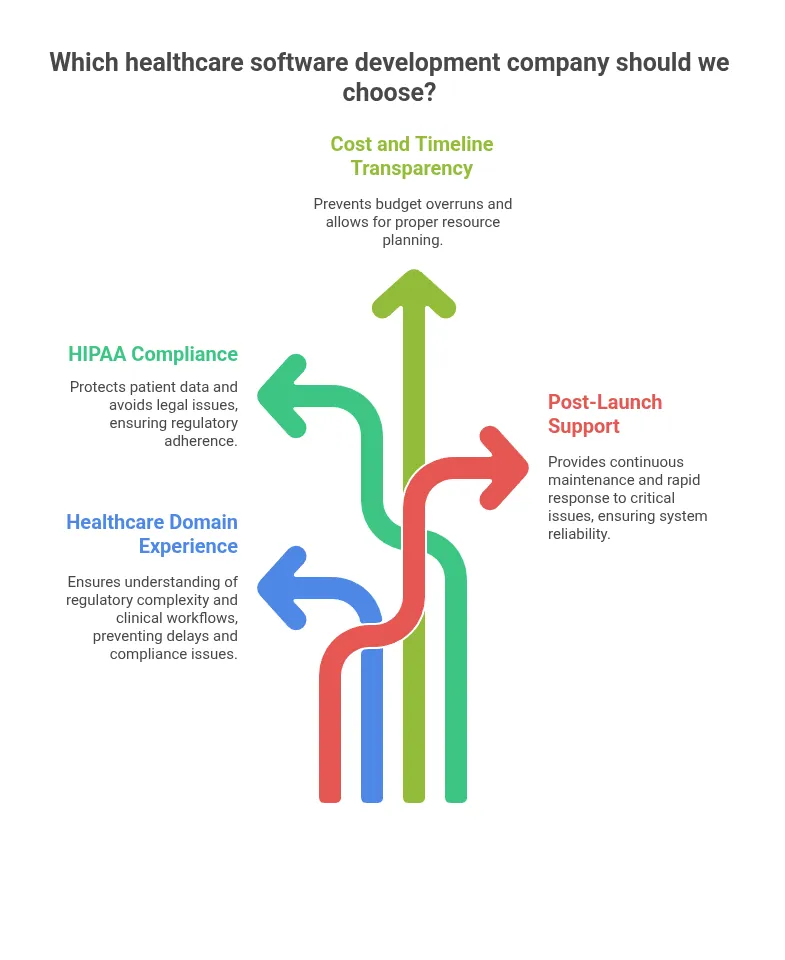Table of Contents
Looking for the right healthcare software development partner to build smart, efficient, and compliant healthcare solutions?
In a world where healthcare is going digital fast, can you afford to choose the wrong healthcare software development company? The landscape of healthcare software development services is vast, but finding the right fit requires careful evaluation.
Choosing the wrong tech partner can slow you down, cost more, and risk compliance. But the right healthcare software development company?
It transforms everything: better care, lower costs, and tools built around your needs.
Just look at MedTech Solutions, they teamed up with a leading provider of software development services for healthcare, cut patient wait times by 40%, and boosted data accuracy by 85% in just six months.
Key factors to consider when hiring a tech partner

1. Technical Expertise
Technical proficiency forms the foundation of successful partnerships with healthcare software development companies.
Evaluate companies based on:
- EHR/EMR Systems: Integration with existing electronic health records
- Telemedicine Platforms: Real-time video consultations and remote monitoring
- AI-Driven Diagnostics: Machine learning for medical imaging and predictive analytics
- Cloud-Based Solutions: Scalable infrastructure for healthcare data management
- Mobile Health Applications: Patient-facing apps for scheduling and health tracking
2. Regulatory Compliance Knowledge
Healthcare regulations are non-negotiable requirements for healthcare software development services:
- HIPAA Compliance: Protecting patient health information privacy and security
- GDPR Standards: European data protection for international operations
- FDA Requirements: Medical device software validation and approval
- HL7/FHIR Standards: Healthcare data interoperability protocols
- SOC 2 Certification: Security controls for service organizations
3. Scalability and Flexibility
The ideal healthcare software development company should offer adaptable solutions:
- Modular Architecture: Components updated independently
- Cloud-Native Design: Automatic scaling based on usage demands
- API-First Approach: Easy integration with third-party systems
- Cross-Platform Compatibility: Ensures support across different devices and OS platforms
- Future-Proof Technology: Modern frameworks supporting emerging healthcare trends
4. Communication and Project Management
Effective collaboration is essential when working with software development services for healthcare:
- Agile Methodology: Iterative development with regular feedback cycles
- Dedicated Project Manager: Centralized communication through a single point of contact
- Regular Status Updates: Weekly progress reports and milestone reviews
- Transparent Documentation: Clear technical specifications and user guides
- Stakeholder Involvement: Including clinical staff in the development process
Questions to ask before signing a contract

1. What specific healthcare domain experience do you have in our specialty area?
Healthcare domain expertise directly impacts project success when selecting healthcare software development companies. Vendors without healthcare experience often underestimate regulatory complexity, clinical workflows, and patient safety requirements, leading to delays and compliance issues.
2. How do you ensure HIPAA compliance and regulatory adherence throughout development?
Non-compliance can result in hefty fines, legal issues, and reputation damage. Experienced providers of custom healthcare software development services build compliance into their development process from day one, ensuring patient data protection and regulatory adherence.
3. Can you provide a detailed cost breakdown and a realistic timeline for our project?
Transparent pricing helps avoid budget overruns and ensures all necessary components are included in healthcare software development services. Realistic timelines prevent disruptions and allow for proper resource planning.
4. What post-launch support and maintenance services do you offer?
Healthcare software requires continuous maintenance and rapid response to critical issues for patient safety and system reliability. Ongoing support is essential for addressing security vulnerabilities, regulatory updates, and operational improvements when working with software development services for healthcare.
Importance of healthcare domain experience
Domain experience distinguishes exceptional healthcare software development companies from generic technology providers. Healthcare presents unique challenges requiring specialized knowledge from custom healthcare software development services.
Critical Roles of Healthcare Domain Experience:
- Without understanding complex clinical workflows, you risk building software that frustrates staff and fails to fit into real hospital operations.
- Without clear navigation of regulatory compliance, you could face costly delays, legal trouble, or even shutdowns mid-project.
- Without strong patient data security and privacy, you’re leaving the door open to breaches, fines, and broken patient trust.
- Without system interoperability, your platform may become a digital island, disconnected, inefficient, and hard to scale.
- Without anticipating healthcare-specific challenges, you’ll end up reacting to problems instead of preventing them, wasting time and budget.
- Without healthcare-experienced developers, you could spend 30–40% more time just teaching your vendor how the industry works.
How to Evaluate Case Studies and Portfolios
A company’s portfolio reveals its true capabilities and track record. Examining past work helps you assess whether they can deliver the quality and expertise your healthcare project demands.
Through these evaluation methods, you can make an informed decision and choose the right development partner.
1. Project Relevance and Outcomes
Look for healthcare projects matching your needs from healthcare software development companies, such as EHR systems, telemedicine tools, or billing software. Focus on measurable results like improved efficiency, higher patient satisfaction, or lower costs delivered by healthcare software development services.
2. Technology Stack Assessment
Evaluate technology stacks used in previous projects by custom healthcare software development services to ensure alignment with requirements. Modern, scalable technologies like AI, cloud computing, and blockchain indicate forward-thinking approaches.
3. Client Feedback and References
Seek testimonials and references from previous healthcare clients to verify reliability and satisfaction with software development services for healthcare. Look for long-term partnerships, repeat business, and positive feedback about communication and delivery.
4. Red Flags to Avoid
Watch for warning signs: lack of healthcare experience, vague project descriptions, outdated technology, poor communication, or no compliance knowledge when evaluating healthcare software development companies.
Red Flags to Watch Out For
Certain warning signs can indicate potential problems that may lead to project failure or compliance issues. Here are key red flags to avoid:
Lack of Healthcare Domain Experience: Healthcare software development companies without prior healthcare projects may struggle with industry-specific requirements, leading to non-compliant or ineffective solutions.
Vague Proposals and Poor Communication: Unclear project scopes, unrealistic timelines, or vague pricing from healthcare software development services indicate poor planning and potential collaboration problems.
No Regulatory Compliance Knowledge: If custom healthcare software development services cannot demonstrate expertise in healthcare regulations like HIPAA, GDPR, or FDA standards, projects may face serious legal risks and costly penalties.

Conclusion
Selecting the right partner from available healthcare software development companies is crucial for organizational success.
Key takeaways include:
- Core Selection Criteria: Focus on technical skills, healthcare knowledge, regulatory understanding, and communication abilities when choosing software development services for healthcare
- Evaluation Process: Success comes from asking smart questions, checking past work carefully, and watching for warning signs
- Proven Impact: Good partnerships with custom healthcare software development services can transform healthcare operations, as demonstrated by MedTech Solutions’ 40% reduction in patient wait times
- Long-term Value: Choosing the right healthcare software development services leads to better care, smoother operations, and strong compliance.
FAQs
How to find a good healthcare software development partner?
Research healthcare software development companies with a proven track record in the industry. Check their portfolios for relevant projects, verify client testimonials, and ensure they have expertise in custom healthcare software development services. Prioritize those with strong healthcare domain knowledge and regulatory compliance experience.
What should I look for in a healthcare tech company?
Look for technical expertise, healthcare domain experience, and commitment to compliance with regulations like HIPAA. Evaluate their portfolio for successful software development services for healthcare, ensure transparent pricing and timelines, and confirm their ability to provide ongoing support. Strong communication and a collaborative approach are also essential.
Why is domain experience important in medical software?
Domain experience ensures the company understands healthcare-specific challenges, such as regulatory compliance, data security, and clinical workflows. This expertise enables them to deliver tailored, efficient, and compliant custom healthcare software development services, reducing risks and enhancing the software’s effectiveness in improving patient care.